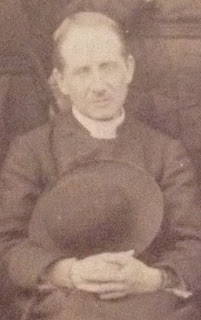The Blessedness of Vows
 |
| Fr George Congreve |
In 1866 Fr Benson, Father Founder of the Society of S John the Evangelist, (SSJE) conducted an interesting
correspondence on the matter of vows with Bishop Wilberforce of Oxford in seeking his
original permission to establish his ‘college of clergymen’. Responding to
Wilberforce’s initial refusal to allow the new Society vows, Benson wrote: “the
blessedness of a vow consists in the faith that God will give special gifts as a
covenant to those who thus definitely give up some possible future of earthly
enjoyment for him” naturally, it would be “mischievous to make a thing
accidentally sinful to ourselves which would not be sinful naturally.” Faith
however “seeks to give up natural possibilities for divine promises.” Writing in 1896 George Congreve, a slightly younger member of the Society became in the 1890s the great teacher in the Church of England about how to form and live the Religious Life. also commented on Vows: “the Religious vows renew all the old vows: Baptism; Confirmation;
Confession; Communion… The whole meaning of this Religion of three vows is
something done to bind me more personally to Christ than I ever realised before
while I kept my independence.”
 |
| Fr Richard Meux Benson |
This is a grace from Christ, who is the only
perfectly consecrated Man, given in his human nature body and soul to God. “And
so Jesus in heaven is the Fountain of all consecration of all holy vocations.” Duty must be thoroughly carried out: “we cannot love laxity under rule because
we cannot honour it; it means the failure of sacrifice, the failure of love.”
Therefore Congreve enjoined Religious to embrace keeping the Rule as “that particular
work which will bring no credit to us. Dull and uninteresting work being
careful in every detail of it… Let it be said ‘she was always faithful always
true.’” But this path was for Congreve no dry legalism, or negative asceticism.
Speaking to his own brethren, he gave one of his arresting exemplars,
contrasting the obedience of the Religious with the obedience of the sentry at
Pompeii whose blind obedience to orders led to a needless death. Through
obedience the Religious is in a “perpetual relationship with Christ,” and
accepting things that go against personal judgement for love of Christ is
deepens that relationship and is therefore “sacramental.”
Congreve agreed with Benson that it
is not the work that is the focus of the Religious Life but rather the
conversion of the soul into God. “If I have learned to pray my work, when I can
work no longer I shall be able to pray. I shall still be increasing in true Religion.” In the end, the purpose of the Religious Life is the development of true
charity over the course of life. “The object of growing old is to grow in love
– to learn at last to exercise that gift of Christ’s love which in youth we had
hardly discovered. And our interest in one another, young or old, is Jesus
Christ’s interest in each.” This cordiality, mutual love, makes the community’s secular work flourish
through their Religious life: “your influence of personal character on children
and young teachers will be in proportion to the soundness of your Community
life, that is to its solidarity and love, the joy of unity, which does not mean
only abstaining from quarrels, but the cordial and generous love of Christ
through us touching all who belong to us.” The Society of the Holy Childhood was a community of teaching sisters. Congreve
drew for them a distinction between a Religious Community, which is the
“family, the Home of Jesus Christ,” and “a boarding house for church workers.”
He concluded, “You will never be too austere, too self-denying to accept
kindness, benignitas - that is,
kindness elevated and purified by piety. Simplicitas
- a simple character that loves One only, and sees all things in the clear
daylight of that love. Hilaritus - gladness;
the open ‘Merry heart’ which ‘has a continual feast’ and ‘doeth good like a
medicine’.



Comments
Post a Comment